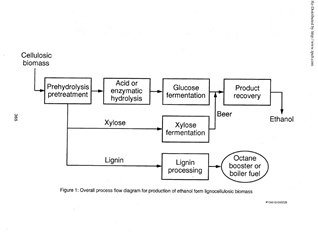Team:Korea U Seoul/Human Practice/Application
From 2011.igem.org
(→Application) |
|||
| (3 intermediate revisions not shown) | |||
| Line 26: | Line 26: | ||
==''' Application '''== | ==''' Application '''== | ||
[[file:APP_KU.png|thumbnail|right|400px]] | [[file:APP_KU.png|thumbnail|right|400px]] | ||
| - | Our system | + | Our system focuses on the biochemical pathway in which glucose is adopted as the starting material and ends up with alkane chain of about 13 carbon atoms in length. |
As there are many biomass feedstock widely and cheaply available, we can get glucose and yield 13 carbon length alkane easily. | As there are many biomass feedstock widely and cheaply available, we can get glucose and yield 13 carbon length alkane easily. | ||
Lignocellulosic biomass is a good example. | Lignocellulosic biomass is a good example. | ||
| - | This existing | + | This existing strategy is known for bioethanol production. In this process, glucose is made during the process as an intermediate. So this intermediate glucose can be used as our starting material. |
Marine agar biomass can be used as well. | Marine agar biomass can be used as well. | ||
Agar consists of a mixture of agarose and agaropectin and agarose is made up of the repeating monomeric unit of agarobiose. Agarobiose is a disaccharide. | Agar consists of a mixture of agarose and agaropectin and agarose is made up of the repeating monomeric unit of agarobiose. Agarobiose is a disaccharide. | ||
| - | Several agarases have been isolated from different genera of bacteria found in seawater | + | Several agarases have been isolated from different genera of bacteria found in seawater and some other environments. With the hydrolytic activity of agarase, oligosaccharides are easily available. |
Latest revision as of 04:02, 6 October 2011
Application
Our system focuses on the biochemical pathway in which glucose is adopted as the starting material and ends up with alkane chain of about 13 carbon atoms in length. As there are many biomass feedstock widely and cheaply available, we can get glucose and yield 13 carbon length alkane easily. Lignocellulosic biomass is a good example. This existing strategy is known for bioethanol production. In this process, glucose is made during the process as an intermediate. So this intermediate glucose can be used as our starting material. Marine agar biomass can be used as well. Agar consists of a mixture of agarose and agaropectin and agarose is made up of the repeating monomeric unit of agarobiose. Agarobiose is a disaccharide. Several agarases have been isolated from different genera of bacteria found in seawater and some other environments. With the hydrolytic activity of agarase, oligosaccharides are easily available.
Contact : |
synbiogroup@googlegroups.com |
 |
|
|
|
 "
"
